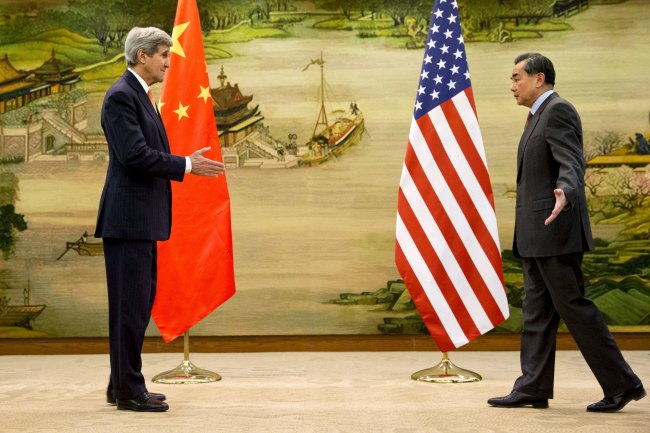[NEWS FOCUS] Why is China so worried about THAAD?
Beijing wary of the system restricting its offensives while exposing strategy
By KH디지털2Published : Feb. 1, 2016 - 16:01
China’s persistent opposition to the U.S.’ potential deployment of an advanced missile defense asset to the Korean Peninsula is triggering questions as to why it is so worried about the system targeting North Korea .
Though the U.S. underscores the defensive nature of the Terminal High-Altitude Area Defense system, China appears to believe the system could be used to limit its evolving offensive capabilities and hinder its efforts to project power farther into the Pacific.
Though the U.S. underscores the defensive nature of the Terminal High-Altitude Area Defense system, China appears to believe the system could be used to limit its evolving offensive capabilities and hinder its efforts to project power farther into the Pacific.

Over the last two decades, China has been pushing to develop longer-range missiles and artillery platforms with longer operational ranges, and greater lethality, survivability and accuracy -- so as to keep potential adversaries including the U.S. at bay in case of any conflict.
However, America’s beefed-up missile defense involving the support of its core allies such as South Korea and Japan could help offset China’s missiles and coastal artillery, putting the Asian power at a disadvantage, observers noted.
“The U.S. can launch counterstrikes after fending off missile attacks with a missile defense system. Although the system is defensive, China would think it is being exposed to the threat of U.S. strikes,” said Park Won-gon, security expert at Handong Global University.
“It is an exemplary case of a security dilemma that is induced by a lack of bilateral trust. Due to this dilemma, China believes THAAD represents a security threat to itself, though it is an interception platform, not an offensive system.”
Nam Chang-hee, military expert at Inha University, said that THAAD could pose a “strategic and psychological” burden to China given that U.S. forces in Korea are those closest to China that could be deployed in case of a contingency involving the two major powers.
“From China’s perspective, U.S.’ Osan and Kunsan air bases are the closest staging points in case of a conflict,” he said. “Thus, in light of their military operations, China remains sensitive to any fortified missile defense systems for these bases.”
Nam, however, pointed out that China’s complaints about THAAD are “unfair” given that it has not taken any substantive steps to address North Korea’s missile threats.
“For Seoul, missile defense is an urgent issue to fend off North Korean attacks. Seoul -- facing a serious security challenge -- is not in a position to care too much about China’s complaints,” he said.
Another reason why Beijing remains opposed to the deployment of THAAD is the symbolism associated with the system, a core element of the U.S.’ global multilayered missile shield program.
Observers say that even though it would be operated by the U.S. forces here, the deployment of THAAD would immediately symbolize Seoul’s participation in the U.S. MD program, which China thinks would ultimately target it.
Seoul has been pushing for its own Korea Air and Missile Defense system, arguing that it would develop an indigenous system, called L-SAM, similar to THAAD. Seoul’s Defense Ministry on Monday said that should both L-SAM and THAAD be operated on the peninsula, it would be helpful for the country’s security.
Chinese officials have expressed discomfort over any discussions regarding THAAD, saying that it is hardly understandable that its friendly neighbor like South Korea would do anything to undermine its security interests.
China, in particular, is concerned about an AN/TPY-2 X-Band radar that comes with the THAAD battery. The radar is known to have a detecting range of around 18,000 km, meaning its coverage can go well beyond North Korea to reach China as well.
The U.S.’ fortified missile shield could also complicate China’s nuclear strategy -- deterrence with the threat of unacceptable damage to its adversary through assured retaliation -- and make the emergent Asian power more vulnerable to foreign attacks.
Robust deterrence can be established when there is a clear prospect that an act of aggression will lead to unacceptable damage in return. But when a potential adversary believes it has a defense mechanism strong enough to counter a retaliatory strike, deterrence could crumble.
By Song Sang-ho (sshluck@heraldcorp.com)












![[Today’s K-pop] BTS pop-up event to come to Seoul](http://res.heraldm.com/phpwas/restmb_idxmake.php?idx=644&simg=/content/image/2024/04/17/20240417050734_0.jpg&u=)




![[KH Explains] Hyundai's full hybrid edge to pay off amid slow transition to pure EVs](http://res.heraldm.com/phpwas/restmb_idxmake.php?idx=652&simg=/content/image/2024/04/18/20240418050645_0.jpg&u=20240419100350)

![[Today’s K-pop] Zico drops snippet of collaboration with Jennie](http://res.heraldm.com/phpwas/restmb_idxmake.php?idx=642&simg=/content/image/2024/04/18/20240418050702_0.jpg&u=)